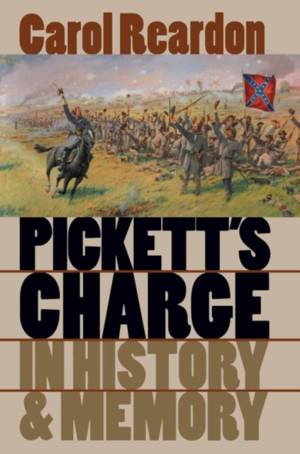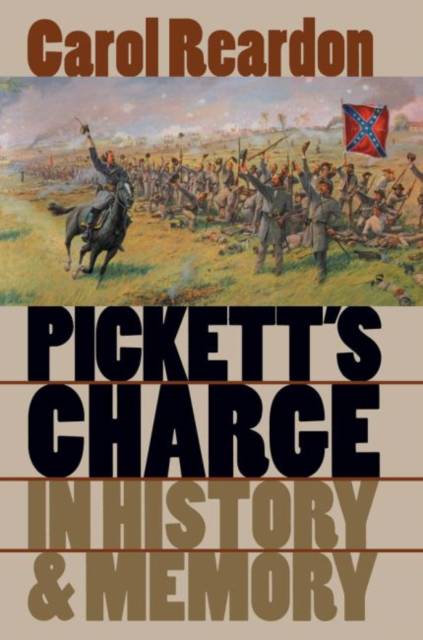
- Afhalen na 1 uur in een winkel met voorraad
- Gratis thuislevering in België vanaf € 30
- Ruim aanbod met 7 miljoen producten
- Afhalen na 1 uur in een winkel met voorraad
- Gratis thuislevering in België vanaf € 30
- Ruim aanbod met 7 miljoen producten
Zoeken
€ 38,95
+ 77 punten
Omschrijving
If, as many have argued, the Civil War is the most crucial moment in our national life and Gettysburg its turning point, then the climax of the climax, the central moment of our history, must be Pickett's Charge. But as Carol Reardon notes, the Civil War saw many other daring assaults and stout defenses. Why, then, is it Pickett's Charge at Gettysburg--and not, for example, Richardson's Charge at Antietam or Humphreys's Assault at Fredericksburg--that looms so large in the popular imagination?
As this innovative study reveals, by examining the events of 3 July 1863 through the selective and evocative lens of 'memory' we can learn much about why Pickett's Charge endures so strongly in the American imagination. Over the years, soldiers, journalists, veterans, politicians, orators, artists, poets, and educators, Northerners and Southerners alike, shaped, revised, and even sacrificed the 'history' of the charge to create 'memories' that met ever-shifting needs and deeply felt values. Reardon shows that the story told today of Pickett's Charge is really an amalgam of history and memory. The evolution of that mix, she concludes, tells us much about how we come to understand our nation's past.
"A fresh look at the disastrous assault.--New Yorker
"A splendidly lively study of the manipulation, not necessarily deliberate or malign, of public opinion.--Atlantic Monthly
"Exceptionally lucid. . . . This fine book provides vivid evidence of just how far we will go to alchemize fantasy into fact.--Jonathan Yardley, Washington Post
"Well-written and meticulously researched, Pickett's Charge in History and Memory utilizes first-rate scholarship to tell a fascinating story. . . . Should win a wide audience among general readers.--Civil War History
Assessing the myths and facts surrounding Pickett's Charge, Carol Reardon explores why this event endures so strongly in the American imagination. She demonstrates that the story told today of the charge is really an amalgam of history and memory and that the evolution of that mix tells us much about how we come to understand our nation's past.
As this innovative study reveals, by examining the events of 3 July 1863 through the selective and evocative lens of 'memory' we can learn much about why Pickett's Charge endures so strongly in the American imagination. Over the years, soldiers, journalists, veterans, politicians, orators, artists, poets, and educators, Northerners and Southerners alike, shaped, revised, and even sacrificed the 'history' of the charge to create 'memories' that met ever-shifting needs and deeply felt values. Reardon shows that the story told today of Pickett's Charge is really an amalgam of history and memory. The evolution of that mix, she concludes, tells us much about how we come to understand our nation's past.
"A fresh look at the disastrous assault.--New Yorker
"A splendidly lively study of the manipulation, not necessarily deliberate or malign, of public opinion.--Atlantic Monthly
"Exceptionally lucid. . . . This fine book provides vivid evidence of just how far we will go to alchemize fantasy into fact.--Jonathan Yardley, Washington Post
"Well-written and meticulously researched, Pickett's Charge in History and Memory utilizes first-rate scholarship to tell a fascinating story. . . . Should win a wide audience among general readers.--Civil War History
Assessing the myths and facts surrounding Pickett's Charge, Carol Reardon explores why this event endures so strongly in the American imagination. She demonstrates that the story told today of the charge is really an amalgam of history and memory and that the evolution of that mix tells us much about how we come to understand our nation's past.
Specificaties
Betrokkenen
- Auteur(s):
- Uitgeverij:
Inhoud
- Aantal bladzijden:
- 296
- Taal:
- Engels
- Reeks:
Eigenschappen
- Productcode (EAN):
- 9780807854617
- Verschijningsdatum:
- 24/02/2003
- Uitvoering:
- Paperback
- Formaat:
- Trade paperback (VS)
- Afmetingen:
- 153 mm x 233 mm
- Gewicht:
- 458 g

Alleen bij Standaard Boekhandel
+ 77 punten op je klantenkaart van Standaard Boekhandel
Beoordelingen
We publiceren alleen reviews die voldoen aan de voorwaarden voor reviews. Bekijk onze voorwaarden voor reviews.











